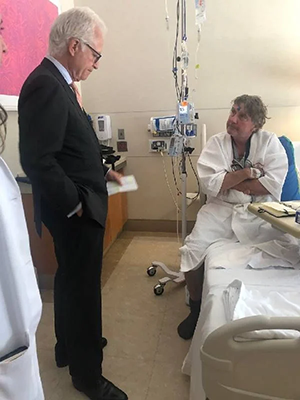
When I first spoke to Rod Nordland about his diagnosis, I gave him the news as kindly and directly as I could. I do that with all my patients — I believe doctors should be honest as well as gentle when talking about a serious diagnosis. Rod’s brain tumor, a glioblastoma multiforme (GBM), is as serious as it gets, with a median survival time of about 15 months. I was candid with Rod, and I advised him to be candid with his loved ones as well.
What I didn’t know at the time, what nobody can know at time of diagnosis, was that Rod’s tumor was going to be one of those rare growths that responds well to treatment, and that he’d be among the small number of GBM patients who beat the odds and live for years after diagnosis. It’s been nearly five years, and Rod has just published a book, is enjoying time with his family and friends, and relishing the unique joy of getting extra years after a brush with death.
Even as patients grapple with a poor prognosis, I encourage them to stay as positive as they can. You simply never know at the beginning of a story how the tale will unfold. We have new clinical trials all the time, with new treatment options and new chances to tackle recurrences. We simply don’t know how any individual will fare, but we do everything we can to add quality years of life. We also have the unexpected — the unpredictable but wonderful chance that an individual will fall into that small percentage of long-time survivors.
I would never tell a patient that a positive attitude makes all the difference in survival — we have all known people who were upbeat and positive but who did not beat the odds. Personally, if I thought I only had a year or two left in my life I’d want to live them in the most positive way I could. But Rod had more than a sunny outlook: he had the tenacity and determination (as well as a cohort of intrepid reporter friends) to turn over every stone and find every possible treatment, and he had the willingness to work hard and keep going. He got the top-notch treatment that we offer everyone here at NewYork-Presbyterian/Weill Cornell Medical Center — we treat everyone here, and everyone gets our best efforts.
Mostly what he had was luck. Five-year survivors of GBM are rare, with percentages in the single digits. But some patients fall into that category, so I tell everyone to be ready for the most likely outcome even as you move forward as if you’ll be one of the lucky few.
Read an excerpt of Rod Nordland's book, Waiting for the Monsoon, and listen to the podcast episode I did with him shortly after his surgery.